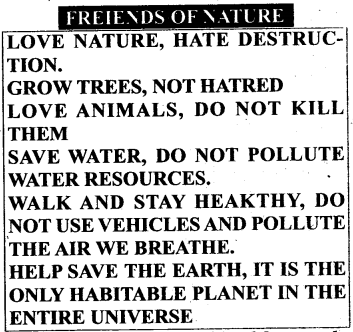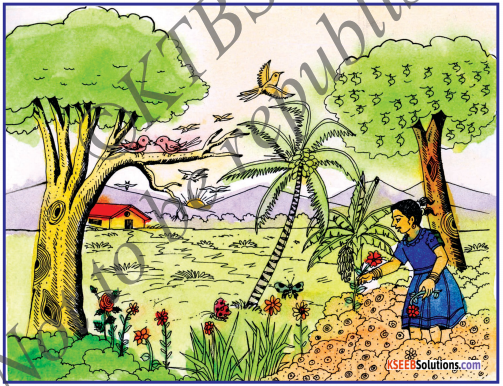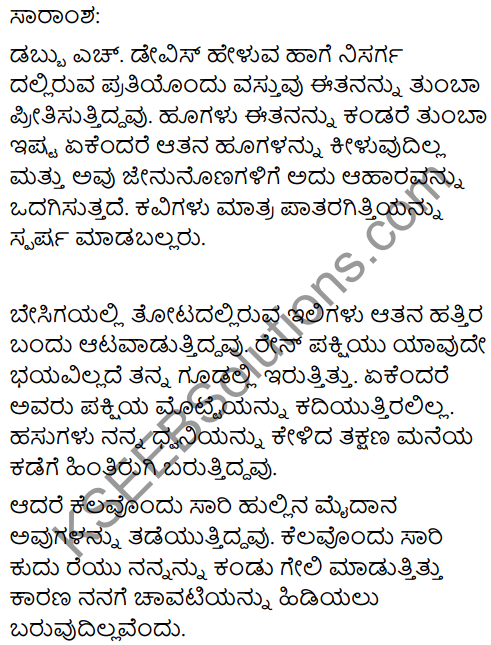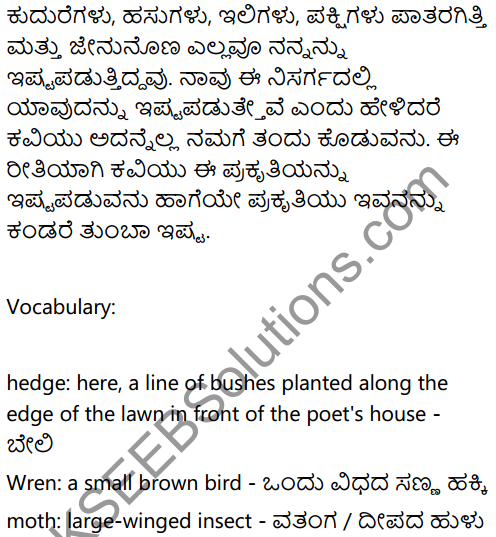KSEEB Class 6 English Poem Chapter 6 Nature’s Friend Questions and Answers are available for free. You can improve your knowledge within a short period by referring to Karnataka Board Class 6 English Chapter 6 Answers PDF. Download Summary, Notes Pdf, KSEEB Solutions for Class 6 English Chapter Wise Questions and Answer. The best option to learn English is using Karnataka Secondary Education Examination Board Class 6 English Solution Notes. Find the best tips and ways to learn English with the help of the KSEEB Class 6 English Answers PDF. The best practice comes with the Karnataka Board Solutions for Class 6 English PDF. Avoid all the troubles of learning English by taking the help of Karnataka Board Class 6 English Answers.
Karnataka State Board Class 6 English Poem Chapter 6 Nature’s Friend
Whether you want to become an expert in English or to get good marks in the exam, you have one and only solution is practicing with KSEEB Class 6 English Chapter wise Solutions. Strengthen your weakness by learning the Karnataka Board Class 6 English Poem Chapter 6 Nature’s Friend on our site. You can learn directly online on our website or learn offline by downloading KSEEB Class 6 English Chapter wise material. Save your time and read KSEEB Class 6 English Subject at your comfort level.
Nature’s Friend Questions and Answers, Summary, Notes
1. Now, discuss the points raised in these questions with your partner. Write down what you say.
Question a.
The poem begins with the words, “Say what you like” What does this expression mean?
a. “You may believe me or not”.
b. You may like what I say or not like it”.
c. “ and I will get it for you”
d. “Tell me what you want to say”.
Answer:
a. “You may believe me or not”.
Question b.
What does “that” in line 4 refer to?
Answer:
Flowers.
Question c.
‘That wins the bee. “So. the bee is defeated.
Answer:
Not True
Question d.
Think about the meaning of the second stanza. Which of the meanings given below is correct?
Answer:
- I touch the moth’s wings as delicately as wind and sun.
- Only I touch the moth’s wings. I touch the moth’s wings as delicately as wind and sun.
Question e.
What did the poet do to turn the mouse’s eyes away?
Answer:
The poet was playing to turn the mouse’s eyes away.
Question f.
Why has the wren become the poet’s friend?
Answer:
The poet will not rob the eggs or the chicks from the wren’s nest, so it has become the poet’s friend.
Question g.
The poet tells us, animals love voices and faces of people. What examples does he give?
Answer:
The hedge stops cows, or they would come right to my house. The horse can tell, my hand could not hold any whip.
Writing:
2. Imagine that you and your friends have formed a group called “Friends of Nature”. You want to distribute handwritten pamphlets. How do you begin? Write 6 sentences to tell what people should not do.

Discuss with your friend how to do this exercise. Write down the words in the blanks.
Salumarada Timakka Treelover is a lady who be called a Nature’s Friend. A centenatian now, she planted and tended about 800 trees in her younger days.
These she planted along the sides of a road in Hulikal, Magadi Taluk, She was honoured with the “Best citizen of the Country and “Friend of Trees” awards. She says half the honour should go to late chikkayya, her teacher.
Her foster son, 25-year-old Umesh has been Planting thousands of trees all over Hassan District.
In this poem, W.H. Davies says, “I am a nature’s friend”. Do you want to be a nature’s friend too?
Nature’s Friend Summary in English

The Poem ‘Nature’s Friend’ is written by W.H. DAVIES. The poet is addressing the readers and proudly proclaims that whatever the readers might think of him or say, he is of the opinion that all things love him. This is because he does not pick any flowers, that attract Bees.
The summer moths are not afraid of him and fly away scared. They think that his hands are like the wind and sun that gently caress their wings. The garden mouse is daring enough to come near him to play because it knows the poet will not harm it but it is wary of him also.
The Wren (a small bird) is familar with the poet. It does not flutter about in anxiety if the poet looked into its nest. It will rest peacefully in its nest because it knows that the poet will not steal her eggs.
The cows grazing lazily in the fields are also friendly with the poet. They are also familiar with his voice. If the edges of the field had not stopped them they would have followed him right to his house when they hear his voice calling to them.
He can proudly declare that his horse knows that his hand could not hold a whip, he is not cruel to his horse. So whatever people may think are say all things like the horse, cow, mouse, Bird, Moth and Bees love the poet because he is a true nature lover.
Nature’s Friend Summary in Kannada


Share this Karnataka Board Class 6 English Poem Chapter 6 Nature’s Friend with your friends to help them to overcome the grammar issues in exams. Keep visiting this site frequently to get the latest information on different subjects. Clarify your doubts by posting the comments and get the answers in an easy manner.